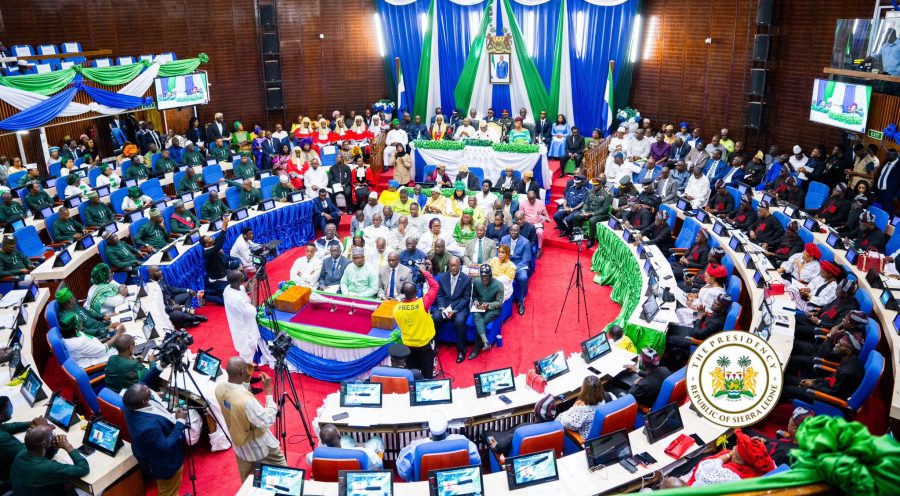The FY2025 National Budget of Sierra Leone, themed “Improving the Well-Being and Quality of Life of Sierra Leoneans,” has come under fire as a document that fails to address the pressing struggles of the nation’s citizens. In a passionate and incisive critique during the final day of budget debates, Hon. Catherine Zainab Tarawalley of Bombali delivered a scathing review, painting a grim picture of life for ordinary Sierra Leoneans. Her remarks shed light on the inadequacies of the budget, challenging its claims and calling for immediate, practical reforms.
Central to Hon. Tarawalley’s critique is the skyrocketing price of rice, a staple food that has become increasingly unaffordable for most households. A 50kg bag of rice, she noted, is now beyond the financial reach of the average citizen. This, coupled with stagnant wages, highlights the widening gap between government rhetoric and the harsh realities faced by Sierra Leoneans. Tarawalley called for a significant increase in the national minimum wage to cushion citizens against rising prices.
The cost-of-living crisis is exacerbated by the country’s high inflation rate and the Leone’s persistent depreciation against the dollar. Despite promises to stabilize the exchange rate, the government’s efforts have yielded little progress, leaving citizens to bear the brunt of a weakening economy. Imported goods, including essential commodities, are now luxuries for many, deepening the daily struggles of families across the country.
Hon. Tarawalley’s critique extended to the government’s much-touted ‘Feed Salone’ initiative and its e-voucher project, aimed at improving food security. While commending the intention behind these programs, she questioned their effectiveness, citing the need for better oversight to ensure they genuinely benefit both farmers and consumers. She also took issue with the centralization of poultry farms in Bo and surrounding areas, arguing that this setup imposes unnecessary transportation costs on citizens and hinders equitable access to resources.
“Equitable distribution of resources is crucial if we are serious about feeding Sierra Leoneans,” she emphasized. The critique underscores the disconnect between the government’s agricultural ambitions and the tangible benefits felt on the ground.
Sierra Leone’s healthcare system, already fraught with inequities, received pointed criticism from Hon. Tarawalley. She highlighted the plight of citizens who lack access to quality healthcare, noting that traveling abroad for medical treatment remains a privilege reserved for the wealthy. “It’s high time we prioritize our health systems here at home,” she argued, calling for urgent reforms to ensure all Sierra Leoneans can access medical care without resorting to costly and often impossible international travel.
Access to clean water remains a fundamental challenge for many Sierra Leoneans, an issue Hon. Tarawalley described as unacceptable in the modern era. She called for increased funding for the Ministry of Water Resources and support for SALWACO’s expansion projects to improve access to clean water. Her statement, “Our people cannot continue to suffer due to inadequate access to this basic necessity,” underscores the critical need for investment in water infrastructure to address this pervasive problem.
Another glaring oversight highlighted by Hon. Tarawalley is the poor state of one-stop centers for survivors of gender-based violence. Except for the center in Kailahun, which benefits from external support, most facilities are in deplorable condition. She urged the government to rehabilitate existing centers instead of constructing new ones that may face similar neglect. Her critique points to the broader issue of underfunding in critical social services, leaving vulnerable populations without adequate support.
In her closing remarks, Hon. Tarawalley did not mince words. Describing the FY2025 budget as an “Open the Door, Let Me Pass” document, she argued that it fails to provide the tangible relief Sierra Leoneans desperately need. Her statement, “Our people voted out the APC hoping for better, but it feels like they have stepped into a worse situation under the SLPP,” captures the frustration of citizens who feel abandoned by their leaders.
Her critique resonated across party lines, drawing bipartisan support and prompting a temporary adjournment of proceedings. This rare moment of unity highlights the growing recognition that the FY2025 budget does little to address the immediate needs of Sierra Leoneans, who continue to grapple with rising costs, inadequate services, and unmet promises.
Hon. Tarawalley’s critique serves as a stark reminder that fiscal policies must prioritize the well-being of the people. For a budget to truly improve the quality of life, it must address the daily struggles of citizens through actionable reforms and meaningful investment in critical sectors. Without these changes, the FY2025 budget risks being remembered as a missed opportunity to alleviate the suffering of ordinary Sierra Leoneans.











